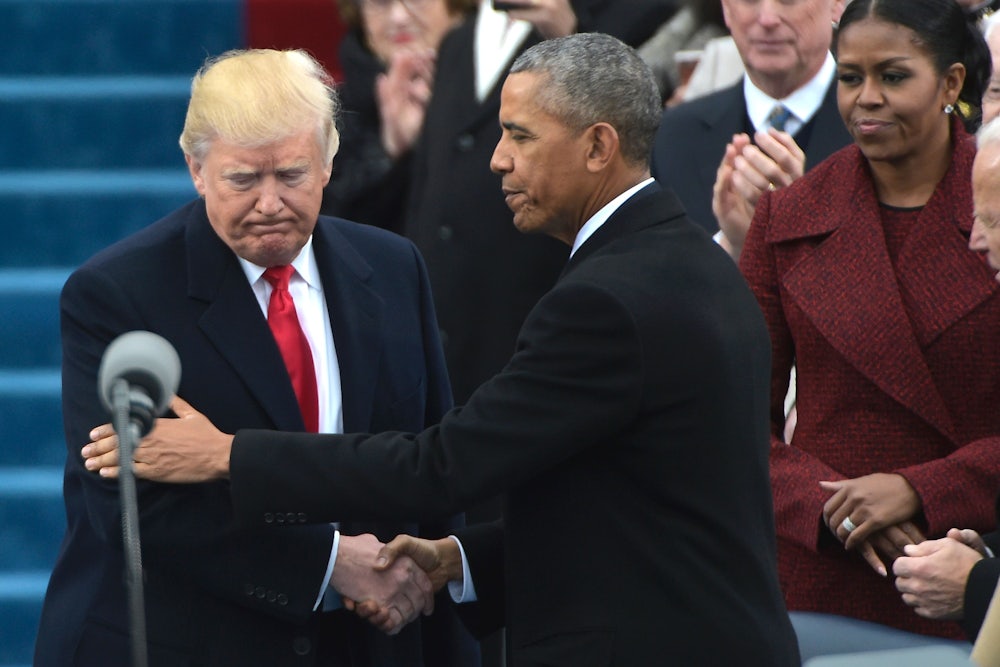Before he left office 11 days ago, President Barack Obama maintained that he didn’t want to become a figurehead for liberal opposition to Donald Trump’s presidency. “I believe in the wisdom that George Washington showed, that at a certain point, you make room for—for new voices and fresh legs,” he said.
Obama had several good reasons for feeling reluctant. The more visible he is, the less impact his comments will have; the more active his role, the less political oxygen available to the liberal leaders of the future; and, of course, he wants to maintain some degree of back-channel influence over Trump himself—a precious resource that would be quickly extinguished by criticizing the new president regularly.
Less than two weeks into retirement, and Obama’s already encountered an outrage too great to remain silent over.
“[T]he President fundamentally disagrees with the notion of discriminating against individuals because of their faith,” concluded a statement from his spokesman Kevin Lewis—a barely concealed rebuke of Trump’s anti-Muslim executive order.
Obama could just as easily have said, “I told you so.” His other reasons for conserving his voice are perfectly defensible, but it looks conspicuously like Trump has discarded even the basic advice Obama gave him, which means Obama sacrifices no influence by criticizing his successor. Obama may not want to speak out often, but he has no reason not to speak out in more bracing terms.
Obama and Trump have been fairly tight-lipped about their conversations, but before he left office, Obama publicly reiterated a couple pieces of basic guidance.
1. Put in place a process that’s open, factual, and respectful of law.
2. Reality has a way of asserting itself.
He linked both pieces of advice in his final presidential press conference two weeks ago.
“[H]ow you put a team together to make sure that they’re getting you the best information and they are teeing up the options from which you will ultimately make decisions, that’s probably the most useful advice, the most constructive advice that I’ve been able to give him,” he said. “That if you find yourself isolated because the process breaks down, or if you’re only hearing from people who agree with you on everything, or if you haven’t created a process that is fact-checking and probing and asking hard questions about policies or promises that you’ve made, that’s when you start making mistakes. And as I indicated in some of my previous remarks, reality has a way of biting back if you’re not paying attention to it.”
The early days of Trump’s presidency, and the humiliating rollout of the anti-refugee order in particular, show Trump internalized none of this.
As massive crowds took to streets and airports across the country, and federal injunctions began piling up, Trump officials called the immigration order a huge success and then contradicted themselves by blaming the chaos on Trump policy adviser Stephen Miller. After meeting with Trump and a number of other White House sources this weekend, Joe Scarborough reported that Miller was able to single-handedly rock the conscience of the world because Trump has done nothing to establish an orderly and lawful process.
“It was Stephen Miller sitting in the White House saying, ‘We’re not going to go to the other agencies. We’re not going to talk to the lawyers. We’re going to do this all alone,’” Scarborough said on Morning Joe. “And I’ll just say it right here, and reporting will bear this out, you’ve got a very young person in the White House on a power trip thinking that you can just write executive orders and tell all of your cabinet agencies to go to hell.”
A great deal of reporting backs up the claim that the most ideologically extreme members of the administration cobbled the order together without external input, but the scapegoating is an effective admission that Trump signs whatever is put in front of him, without reading or understanding it. The incentive for ambitious operators within the administration is thus to do whatever’s necessary to get unvetted orders and choices before the president by any possible means, so they become national policy before sensible people can intervene.
Heeding Obama’s advice might have helped Trump avoid making an obvious and monumental error, but Trump either lacks the capacity to run the government in an orderly fashion or intentionally discarded Obama’s recommendations, or both. When reality quickly asserted itself, as Obama promised it would, Trump claimed (out of ignorance or malicious dishonesty) that he was merely reprising “ what President Obama did in 2011 when he banned visas for refugees from Iraq for six months”—a “ban” that quite literally never happened.
1/3) There was no 2011 ban on Iraqis. There was no Executive Order. In response to specific threat, additional vetting was added
— Ben Rhodes (@brhodes) January 30, 2017
2/3) This was administrative step taken through full inter-agency - State, DHS, intel community. Pipeline slowed and then picked up again
— Ben Rhodes (@brhodes) January 30, 2017
3/3) More inter-agency vetting of Iraqi refugees in response to threat is standard process. EO banning people from several countries is not
— Ben Rhodes (@brhodes) January 30, 2017
This is the bad-governing equivalent of claiming, as Trump did last year, that Hillary Clinton started the birther conspiracy theory. Trump has always warped reality to avoid admitting error or wrongdoing. The idea that he’d run a reality-based decision-making process as head of the executive branch runs contrary to his need to insulate himself from unpleasant truths. There is no reason to think that in the heat of a true crisis, Trump will call upon Obama for guidance. Even if he did, it’s clear he wouldn’t heed it anyway. Under the circumstances, Obama still may not want to speak out very often, but when he does, he might as well just say exactly what he thinks.
